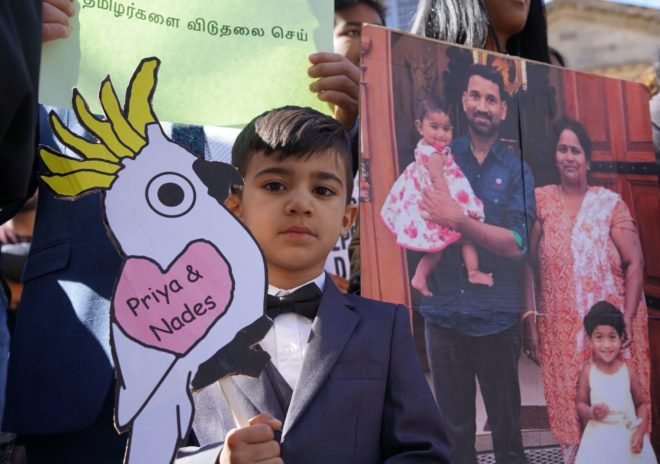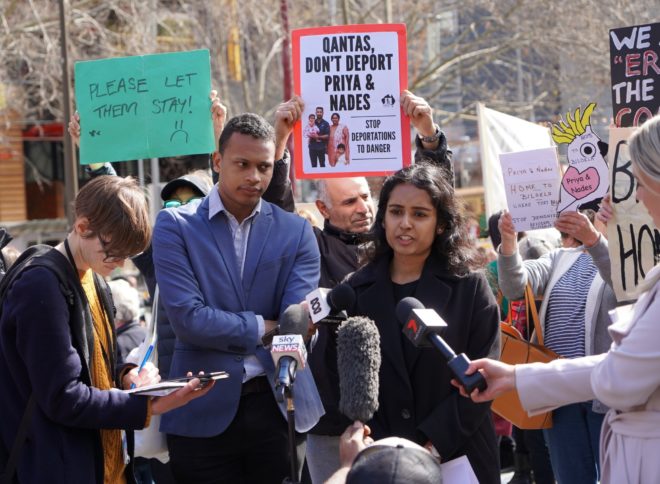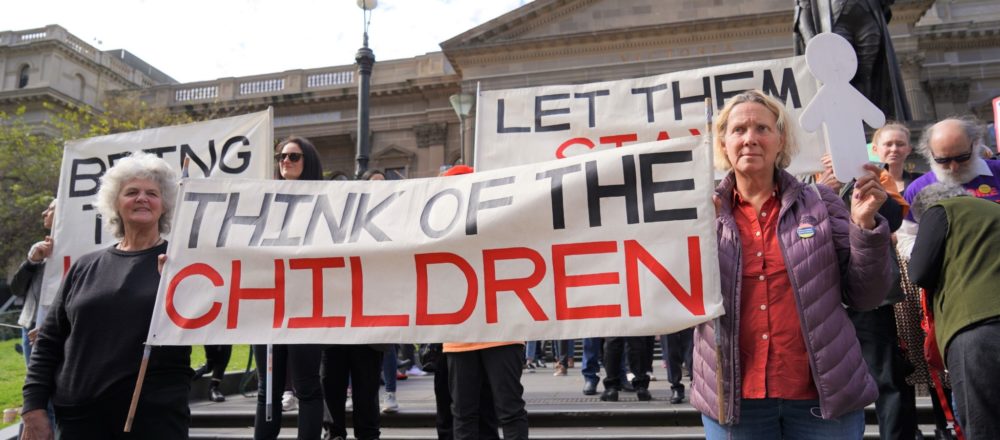Around midday AEST on Sunday I got off the phone after speaking with Priya Nadesalingam who had spent the past three days in hospital on Christmas Island. She was finally placed on a medical evacuation flight to Perth at 7pm Saturday night. This was only after extensive advocacy to Australian Border Force (ABF) officials in Canberra by her treating doctors at Christmas Island Hospital, regarding the urgent need for further investigation and subsequent treatment for her severe abdominal pain. Priya has other significant comorbidities that put her at further risk of complications and death in the event of any serious illness. She has already faced inordinate delays and flat out denials of specialist treatment for some of her other medical conditions by the ABF.
She leaves behind her an understandably upset husband & daughters, Kopika, five, and Tharunicaa, three, who have already been exposed to innumerable traumas through detention and the many attempts by the federal government to deport them back to danger in Sri Lanka. Tharunicaa and Kopika remain stuck in a prison on Christmas Island with their father Nades, their suffering now further compounded by their separation and fears for the well-being of their mother whom they have been never been parted from for this long in their short lives. Despite the requests of her doctors, Nades, Tharunicaa and Kopika were not allowed to accompany her to Perth to allow them to stay together as a family — not only to support Priya but to reassure her two distraught daughters. Millions of Australians would understand the fear and uncertainly of having a loved one in hospital with a serious illness, and Priya is now being forced to endure this physically and mentally traumatic experience alone.

While her family were denied the right to accompany Priya during this traumatic time, only being allowed as far as the gates to the Christmas Island airport, two border force officers still crammed themselves into the already tight confines of the evacuation plane carrying another patient, essential clinical staff and flight crew. While I worked in rural and remote communities throughout the Northern Territory, it was considered best practice and was routine to allow patients being medevac’ed or transferred for intensive specialist care to have a family member escort them. This was especially important when the patient was from an Indigenous or other culturally & linguistically diverse background where English wasn’t their first language: as they would benefit greatly during their healthcare journey from the social support of a family member as they deal with their serious illness.
Priya had been suffering debilitating abdominal pains since the first of July and only now, after 18 days, has she finally been transferred to an appropriate healthcare centre with the necessary facilities to definitively diagnose and treat her potentially life-threatening condition. She had been forced to resort to taking strong opiate medication in the detention centre for days after being reviewed several times at Christmas Island Hospital, where the treating staff were left with no other options whilst they waited for ABF Officials to make a decision regarding their requests for her transfer to Perth.
It is far from best practice to send a patient home with severe abdominal pain requiring oral opiates without a definitive diagnosis, or at the very least all immediately life-threatening causes ruled out.
Priya is highly critical of the staff from International Health & Medical Services (IHMS) who are contracted by ABF to provide healthcare to detainees within the detention centre, whom she believed showed little care in wanting to diagnose the actual cause of her severe pain and other symptoms.
As Priya lay alone in her hospital room on Sunday, on the fourth floor of the Fiona Stanley Hospital in Perth, she told me that she hadn’t eaten for four days as she continued to be kept fasted. Now, as she anxiously awaits doctors from the Surgical Unit to finally review her and explain to her the next steps in her treatment, she only has the two ABF officers that continue to sit guard outside her room for company. Priya also wonders why, despite now being in Perth, the ABF continue to have a hand in limiting Nades access to the Wi-Fi in the detention centre. This prevents her from making a video call, sending photos or using social media to reassure Tharunicaa and Kopika, who are worried sick back on Christmas Island. If there was ever a case in point to highlight the need to prevent ABF being granted indiscriminate powers to seize mobile phones from detainees, which the government is currently trying to pass legislation to enable, then it is this family and all that they have suffered over the past two and a half years in detention.
Visitors have been barred from detention centres since March, and Priya was not allowed to have non-family visitors at Christmas Island Hospital. She wonders if visitors who could provide invaluable support during this distressing time will also be barred from seeing her in hospital in Perth. It is important to note that all other patients can have two visitors at a time between 8am and 8pm every day of the week.
Priya speaks highly of the medical staff at Christmas Island Hospital who were working to the best of their ability within the constraints of the limited healthcare resources available to them on the island and who had to fight for her transfer by jumping through numerous bureaucratic hoops with IHMS and the ABF. For any other patients on the island bar this one Tamil family, the doctors at the hospital would be speaking only with other healthcare professionals, typically led by a District Medical Officer (DMO) who would be charged with discussing a patient’s clinical need for urgent transfer and who would lead the decision making around it. Whether this mother, wife and vulnerable asylum seeker, who has spent over two years imprisoned with her children, receives the urgent medical care in clinically prudent timeframe that she is entitled to as a human being in the government’s care, should not depend on non-clinical ABF bureaucrats in Canberra.

Why is it that vulnerable asylum seekers continue to receive second rate care from the federal government? All persons in the government’s care should be afforded broadly the same standard of healthcare as other Australians, especially in emergency situations such as this.
Priya’s current predicament and the ABF bureaucracy that has held up her transfer for emergency medical care harkens to that of 24-year-old Iranian asylum seeker Hamid Khazaei who died in 2014 from a leg infection. The Queensland coroner found in 2018 ‘that failure by Australian Immigration officials to urgently grant a doctor’s request’ for ‘transfer to Australia’ from Manus Island where he was being detained, was one of the main contributing factors to his death. Even after Hamid’s death, 12 other asylum seekers dying in off-shore detention and many others dying in detention in Australia and in the community, the Australian government’s tune has still not changed in the face overwhelming evidence and representations made to them by the medical and healthcare community in Australia in regard to the adverse health impacts on asylum seekers of their policies of indefinite and offshore detention.
Based on the symptoms Priya described to me today she could have been suffering from any number of conditions that have the potential to unpredictably rapidly deteriorate and became life threatening without the correct diagnosis and treatment being administered in a timely fashion. A CT scan, which would be considered a standard imaging modality even in many rural communities, would be essential in cases of undifferentiated abdominal pain such as Priya’s, but is sadly not available on Christmas Island.
Even many standard diagnostic pathology tests need blood samples to be flown to laboratories in Perth for processing adding numerous delays to care for patients on the Island.
This once again raises the question of why a detention centre continues to be operated in a remote Australian Territory with limited healthcare facilities. Priya’s medical evacuation may have cost in the order of $100,000 in addition to the well over $200 million that has now also been spent since March 2019 in reopening and keeping the Christmas Island Detention Centre operational. Only this one family of four has been detained there since its reopening. A complement of over 100 staff are required to keep the centre running, many of which are fly-in fly-out staff who we discovered earlier this year weren’t quarantining when travelling back and forward from the island, putting this family and the residents of Christmas Island at risk of COVID-19 infection. On Priya’s arrival to Perth she was advised that she had to remain in quarantine for two weeks, however it is unclear if the same notice was once again given to the accompanying ABF staff and contractors.
If there was ever a time to end this family’s torture it is now. Acting Immigration Minister Alan Tudge and Home Affairs Minister Peter Dutton with the stroke of a pen could use their discretionary Ministerial Powers to grant this family Asylum immediately, a power that is routinely exercises hundreds of times each year.
At the core of this bigger issue is a mother and wife who lies alone in pain in a hospital bed in Perth, scared and uncertain for her future, separated the longest she has ever been from her two little girls, who are still stuck in an Island prison with their father. A prison that the youngest daughter Tharunicaa has spent every one of her three birthdays in. This is all while the Australian government is continuing to fight to deport them back to a country run by the same politicians and military officials who oversaw the genocide of up to 100,000 of their fellow Tamils in 2009 and who have indifferently ignored all calls from the UN Human Rights Council for an independent investigation into these alleged war crimes and crimes against humanity.





